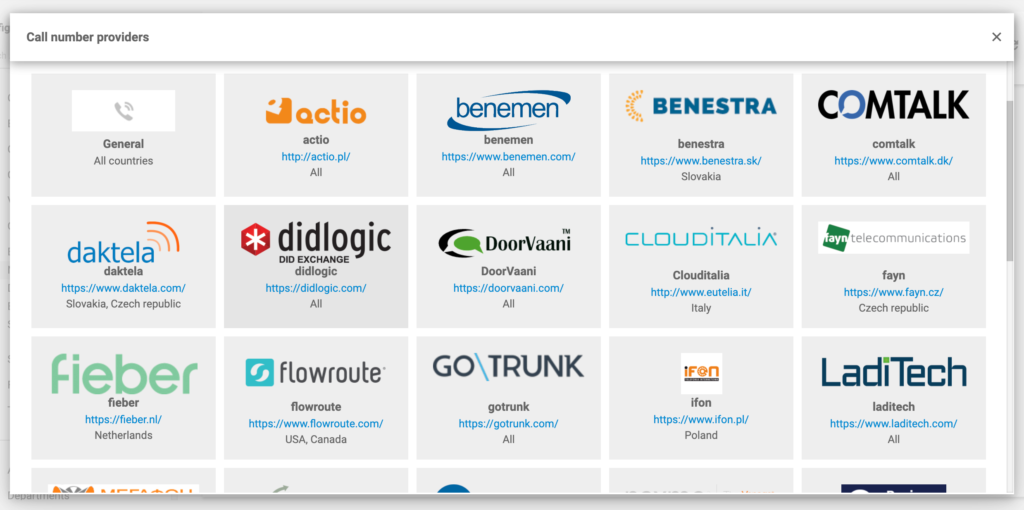What is a non-fixed VoIP phone number?
A non-fixed VoIP phone number is a virtual phone number that isn’t associated with the owner’s physical address. Instead, it only requires an internet connection, and unlike traditional phone numbers, you’d be able to use it from any physical location.
In simple terms, you can make calls or send texts from a non-fixed VoIP number with an area code of a particular location without residing or having an address there.
This flexibility makes it easy for businesses to establish a local presence in an area even if they aren’t physically present. All you need is a wireless VoIP router or some other modem, and you’re good to go. Also, by calling customers in a particular location with numbers bearing a matching area code, they are more likely to gain their trust. This is a smart way to boost your business reach.
Non-fixed VoIP numbers are also cost-effective to use as you can call people in different locations for the same price.
Skype and Google Voice are common platforms that offer free non-fixed VoIP services. To start using them and making non-fixed VoIP calls, simply install the respective mobile apps and create an account.
Customer service software for the app generation
Provide customer support on the go with LiveAgent's mobile help desk app for both Android and IOS systems.
How can you tell if the caller is using a VoIP number?
VoIP numbers look like regular cell phone numbers. So, you can’t tell if a call or text is from a VoIP phone simply by looking at it.
VoIP providers allow you to make calls using the voice over internet protocol. This technology is cloud-based and lets you make calls through an internet connection. Hence, when someone calls you using an internet phone or VoIP service, it’s difficult to tell which physical location the phone call originated from.

Looking up the caller ID or CNAM (Caller Name Delivery) of the number, however, can help you find out if the phone call originated from a VoIP number.
Who uses non-fixed VoIP?
Non-fixed VoIP users range from individuals to businesses. Due to the flexibility it provides, a VoIP number is a valuable tool that allows companies to serve their customers who are based in areas where they don’t have a physical presence.
Businesses with employees spread across a large area can also use non-fixed VoIP lines to stay connected without the cost of getting a physical location.
Cloud-based call center providers like LiveAgent also integrate non-fixed VoIP providers into their software. This way, their users can create call centers with agents in any part of the world. In this case, the call center provider automatically assigns non-fixed VoIP numbers with the same local area code as locations where the most calls come from.

Looking to enhance your call center's software capabilities?
LiveAgent offers over 50 integrations with VoIP providers.
Apart from operating without the location barriers, these businesses also get to save costs that come with using a traditional office phone system for long-distance or international calls.
Unfortunately, because of the flexibility and ease with which anyone can get these non-fixed numbers, they are also used for criminal activities by scammers and fraudsters.
Can you call and text back a non-fixed VoIP number?
Non-fixed VoIP number assignments can receive incoming calls and texts as long as the VoIP caller has an active internet connection. A VoIP number assignment is a number you get for VoIP calling when you sign up with a service provider.
If you own a VoIP account, you can also make calls and send texts from your non-fixed number to other VoIP numbers or regular phone lines.
If you’re having difficulty making calls or sending texts, contact your VoIP provider’s support team.
Can a non-fixed VoIP be traced?
As mentioned earlier, non-fixed VoIP lines are easy to get and provide flexibility, especially when it comes to international calling. Unfortunately, this flexibility also makes it challenging to trace. However, it isn’t impossible to trace a non-fixed VoIP number to the caller.
Tracing voice communications from a non-fixed VoIP phone comes in handy if you suspect criminal activity and want to report it to the authorities.
Although it’s not always easy to trace a non-fixed VoIP call, there are different ways to do it safely.
You can search phone books and records or use an identification service such as caller ID.
- Phone books and records: One way to identify a VoIP caller is by checking telecommunication companies’ phone books and records. These records can be online or offline. When you get access to these records, simply search for the user associated with the number.
Note, however, that VoIP assignments can change without a corresponding update in the records. So, the user associated with the number may no longer be the current holder.
- An identification service: If you have access to an identification service, you might be able to figure out the owner of a VoIP line. The problem with this method is, most callers with criminal intentions fake their caller ID, so it’s difficult to identify them.
While these methods may work, you may still find it challenging to find the caller’s physical address. So, you cannot rely on the results you get. The best approach to dealing with fraudulent VoIP numbers is reporting them and leaving the rest to the authorities.
What is the difference between fixed and non-fixed VoIP phone numbers?
There’s one main difference between the two types of VoIP numbers. While fixed VoIP numbers are associated with the holder’s physical address, a non-fixed VoIP number isn’t linked to the holder’s physical address.
If you’re trying to decide whether to opt for a fixed or non-fixed VoIP number, here are some pros and cons you should consider:
Pros and cons of fixed VoIP numbers
Pros
- A credible business phone number that your customers can easily trust.
- Emergency services can easily trace your exact location in case of safety issues, e.g., making 911 emergency calls.
- Access to more advanced calling and routing features for your customers and employees.
Cons
- Non-fixed VoIP providers require a detailed physical address- including your street address- from you before issuing a phone number.
- Fixed VoIP service providers generally charge fees for the setup and usage of their features.
- Long-distance calls are expensive.
- If your business caters to people in a large area, it’ll be challenging to establish a local presence since your phone numbers must be tied to one of your offices or headquarters.
Pros and cons of non-fixed VoIP numbers
Pros
- You can easily establish a local presence with your customers regardless of your physical location.
- Non-fixed VoIP numbers are easy to get and simple to set up.
- Unlike with fixed VoIP numbers, traditional landlines, or other business phone services, you can call people in different locations for the same price.
Cons
- Non-fixed VoIP numbers are not easily identifiable, and your customer might confuse your calls with spammers or fraudsters.
- Limited access to emergency services since it’ll be difficult to trace your phone call to a physical address.
Benefits of non-fixed VoIP numbers
Using a non-fixed VoIP number can boost your business’s external communications and give you more flexibility in the following ways:
Cheaper call prices
Non-fixed VoIP solutions allow you to make calls to different locations without the high prices. Since you’ll be making calls over the internet, all you have to pay is your internet subscription cost (no phone bill!). This makes it a highly cost-effective option for business purposes.
Ease of acquisition
Most business VoIP providers require only an email address to create an account with them. After a few sign up steps, you’ll be assigned a non-fixed VoIP number and can start communicating with your customers in no time.
For example, if you run an online business with no brick-and-mortar shop, you can own a non-fixed VoIP business line with little more than an email address.
Easy business expansion
By owning a non-fixed VoIP number, you can expand your business’s reach beyond your physical location. For example, you can live in the US and contact your Canadian customers with a local phone number.
Unlimited cloud calling features
Many non-fixed VoIP solutions come with additional features. For example, LiveAgent’s VoIP call center phone system is equipped with advanced features such as IVR, automatic callback, ACD, smart call routing, call transfers, softphones support, unlimited call recordings, video calls, and so on.
If you have a team of remote workers, they can collaborate effectively regardless of their physical location, thanks to LiveAgent’s calling features.
Discover all that LiveAgent has to offer
Enjoy the benefits of an omnichannel cloud-based call center software.

Frequently Asked Questions
What is a non-fixed VoIP phone number?
A non-fixed VoIP phone number is a virtual phone number that isn’t tied to any physical address. Instead, it allows you to make calls over the internet using voice over internet protocols.
How can you tell if the caller is using a VoIP number?
You can tell a VoIP number apart from a traditional phone number by looking up the caller ID and CNAM data for the call.
Who uses non-fixed VoIP?
Businesses use non-fixed VoIP solutions to establish a local presence and enhance global communication among a team of remote workers. Individuals who need the flexibility of being able to make cheap international calls also use these numbers. Unfortunately, criminals also take advantage of these numbers to carry out scams and fraudulent activities.
Can you call and text back a non-fixed VoIP number?
Yes, you can call or text back a non-fixed VoIP number as long as they have an active internet connection.
Can a non-fixed VoIP be traced?
Although it’s quite challenging to trace a non-fixed VoIP number, it is possible. However, the results you get might not be accurate. Your best bet is to allow the appropriate authorities to trace the number for you if you suspect criminal activity.
What is the difference between fixed and non-fixed VoIP phone numbers?
Fixed VoIP numbers are linked to a personal or business address, while non-fixed VoIP numbers are virtual numbers that aren’t restricted to any physical address or geographical location.
Benefits of non-Fixed VoIP numbers
Non-fixed VoIP numbers are easy to acquire and usually require you to go through a few sign up steps with your email address. Because they aren’t restricted to any geographical location, VoIP solutions make it easy for a business to establish a local presence. It’s also budget-friendly and comes with additional features depending on which provider you choose.
After you've learned about non-fixed VoIP numbers, you might be curious about the broader concept of VoIP numbers. This article explains what VoIP numbers are and why they are beneficial for businesses. It also covers the differences between VoIP numbers and regular phone numbers, providing useful insights into pricing and technology.

 Български
Български  Čeština
Čeština  Dansk
Dansk  Deutsch
Deutsch  Eesti
Eesti  Español
Español  Français
Français  Ελληνικα
Ελληνικα  Hrvatski
Hrvatski  Italiano
Italiano  Latviešu
Latviešu  Lietuviškai
Lietuviškai  Magyar
Magyar  Nederlands
Nederlands  Norsk bokmål
Norsk bokmål  Polski
Polski  Română
Română  Русский
Русский  Slovenčina
Slovenčina  Slovenščina
Slovenščina  简体中文
简体中文  Tagalog
Tagalog  Tiếng Việt
Tiếng Việt  العربية
العربية  Português
Português 







